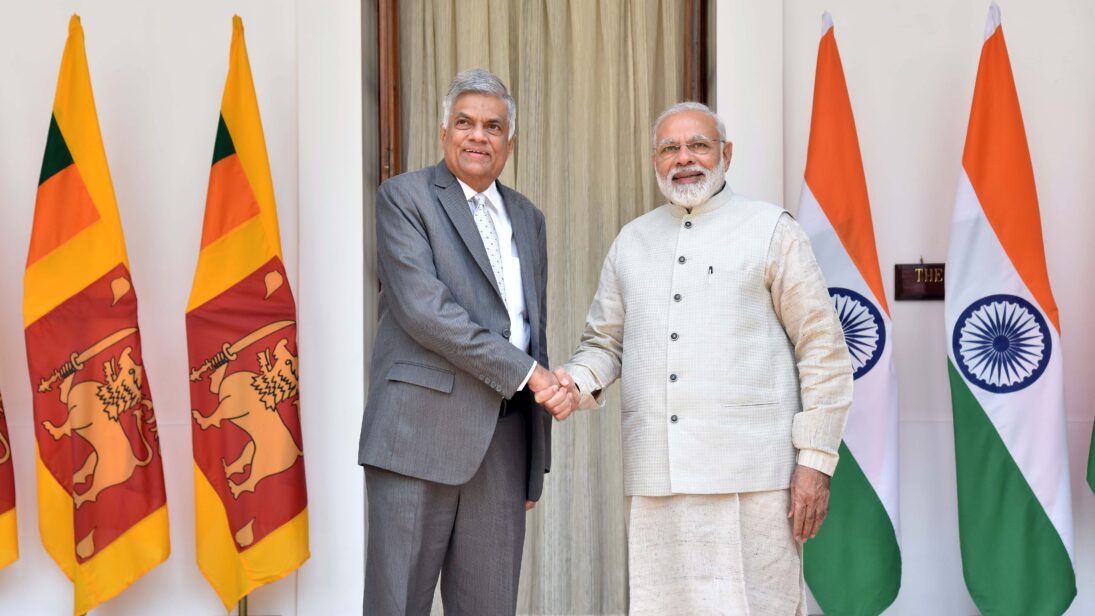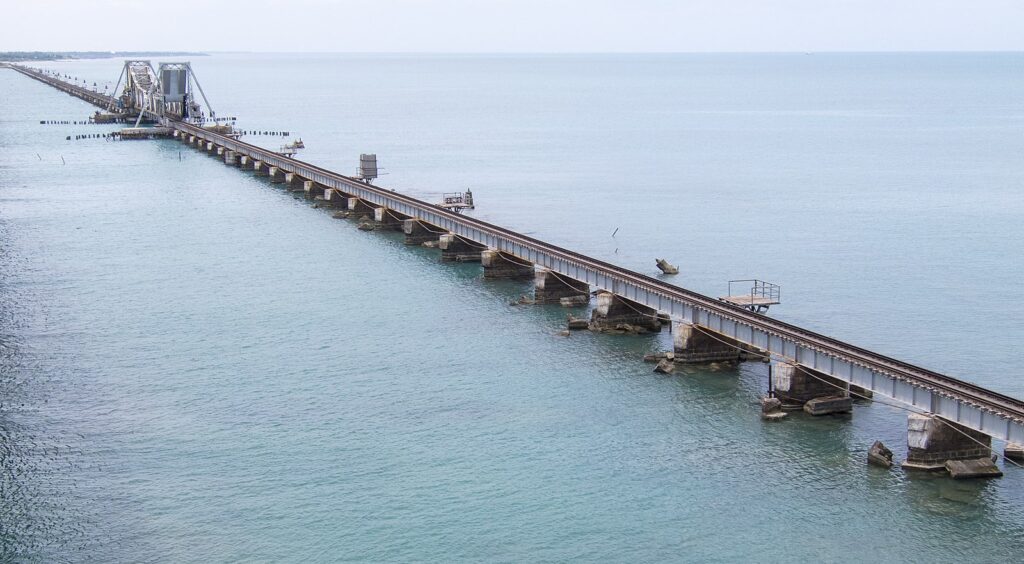
by Ananya Sharma, Abhishank Mishra
Recently, New Delhi’s relationship with Colombo has become fraught with tension over Katchatheevu, a tiny, uninhabited, 285-acre island in the Palk Strait between the Indian state of Tamil Nadu and Sri Lanka. In the midst of national election campaigning in India, Prime Minister Narendra Modi tweeted on April 1 that Dravida Munnetra Kazhagam (DMK), Tamil Nadu’s regional ruling party in alliance with the Indian National Congress, was responsible for harming the interests of Tamil fishing communities by giving away the island to Sri Lanka. Foreign Minister S. Jaishankar built on the rhetoric by targeting Congress for ceding the island. The Sri Lankan side responded to the controversy by asserting that India’s claims over Katchatheevu have no grounds. Sri Lankan Foreign Minister Ali Sabry reiterated that Colombo doesn’t see any need to re-open talks on the issue, which was resolved 50 years ago.
The Katchatheevu issue bubbles up from time to time in the bilateral relationship, with the Sri Lankan navy having regular face-offs with Tamil fishermen in the waters surrounding the island –in fact, 178 Indian fishermen and 23 trawlers were detained in 2024 alone. The island is relevant not only for supporting the economic sustenance of the fishermen communities but also has shared cultural significance, as it hosts the annual St. Antony’s church festival commemorating the patron saint of seafarers worshiped by fishermen on both sides. Indian pilgrimage for this year’s festival was canceled due to rising tensions and strikes in the wake of the Indian fishermen’s arrests on February 16.
India’s provocative election rhetoric on the Katchatheevu issue is a reminder emblematic of the constant negotiation between normative and geopolitical assertions of territorial sovereignty in the international system. The normative understanding of sovereignty is grounded in principles of international law as embodied in bilateral agreements between India and Sri Lanka. However, the strategic interests and populist rhetoric of the ruling party in India could result in a violation of international law and spillover effects, impacting India’s standing in the region.
Drawing Lines on Water: A Brief History of Maritime Jurisdiction
The India-Sri Lanka maritime agreement of 1974, signed between Indira Gandhi and Sirimavo Bandaranaike, placed the island of Katchatheevu on the Sri Lankan side of the International Maritime Boundary Line (IMBL). According to international law, maritime boundaries are established based on equidistance of the median line from the coastal areas of both contracting parties. The 1974 accord is unique because it sought exemption from the use of a median line, as notified under Article 15 of UNCLOS, in favor of an ‘adjusted equidistant line’.
In the bilateral agreement, India and Sri Lanka divided 2,100 square nautical miles in the ratio of 1.02:1 in favor of India. This meant India got 0.02 units more than the equal share. India negotiated the adjusted equidistant line to maintain ‘bilateral exclusivity’ to the issue, which entailed a clear preference for non-involvement of a third party.
The agreement allowed Indian fishermen and pilgrims to visit Katchatheevu without travel documents but did not explicitly specify the fishing rights of Indians in the waters around Katchatheevu. In 1976, bilateral relations further strengthened as Sri Lanka recognized India’s sovereign rights over the Wadge bank, a resource-rich area south of Kanyakumari. The agreement allowed Sri Lankan fishermen access to Wadge Bank for fishing limited to 2000 tonnes of fish annually, for a period of three years. At the time, leadership on both sides approached the trading of territorial claims as being carried in ‘good faith’ and reflecting the proximate ties between Gandhi and Bandaranaike.
Between 1976 and 2009, Sri Lankan fishing in the region was sparse due to the three-decade civil war that ravaged the country’s industries. As a result, Indian fishermen during this time began using capital intensive mechanized trawlers due to the ‘blue revolution.’ This negatively impacted small-scale Sri Lankan fishermen who used small boats and passive fishing gear like stationary nets. Given that the practice is banned in Sri Lankan waters, they claimed that their fishing space was being encroached on by Indian fishermen who trespassed the waters in the Palk Bay region.
In 2008, the Tamil Nadu government led by J. Jayalalithaa filed a petition in the Indian Supreme Court challenging the constitutional legitimacy of the 1974 and 1976 agreements between India and Sri Lanka. Tamil Nadu asserts that Katchatheevu is an integral part of India since it fell under Ramanathapuram Zamindari, ruled by the Sethupatis, whose territorial right was recognized by the Governor of Ceylon in 1845. Furthermore, in 2013, an unanimous resolution seeking the retrieval of Katchatheevu was passed in the Tamil Nadu legislative assembly.

At the beginning of PM Modi’s first term in 2014, then-Attorney General Mukul Rohatgi asserted to the Supreme Court that India had not ceded any territory or relinquished sovereignty over Katchatheevu. The issue was brought into the limelight again in 2024 by the BJP’s Tamil Nadu president K. Annamalai before the general elections.
Normative vs. Strategic: Regional Implications
The exclusion of local voices in diplomatic considerations is a major cause of resentment among the fishermen of Tamil Nadu. Therefore, by framing India’s strategic interest in Katchatheevu around the local grievances of fishermen, the BJP tapped into Tamil feelings of national pride over territorial integrity. The re-claiming of territory and the aligning call for ‘taking back control’ is a common denominator of populist governments seeking to consolidate internal legitimacy, particularly during elections. While the commitment to resolve the issue favorably for Tamil fishermen has galvanized voter support for the BJP, India’s re-ignition of territorial claims over Katchatheevu also reveals the competing tensions between normative and strategic claims to sovereignty in India’s neighborhood foreign policy approach.
India’s bid at revising claims of normative sovereignty is misleading, risky, and could have spillover effects. Firstly, it may destabilize the existing status quo, based on formal bilateral agreements and informal cultural affinities. Secondly, any unilateral action would imply a violation of international law which risks destabilizing bilateral exclusivity of the matter and undoing close to five decades of diplomatic efforts at fostering amicable relations. India has painstakingly built an image as a country that respects a rules-based international order. Any kind of unilateral action to rescind the agreement would not only weaken India’s normative standing but also the fundamental tenets of its Neighborhood First Policy.
Third, China has attempted to assert its influence by infiltrating the area through its spy ships. In a similar vein, Sri Lankan willingness to include the United States in the fisherman dispute to enforce the legal regime is disconcerting from India’s vantage point given its commitment to bilateral exclusivity and rejection of third-party mediation. The ruling party’s provocative electoral rhetoric around Katchatheevu therefore may impact India’s bid to maintain its preponderance in South Asia to counter China’s growing presence in the Indian Ocean region.
Finally, progress on projects such as the proposed Sethusamudram Canal Project (SSCP), which aims to create new shipping lanes connecting the Gulf of Mannar and the Bay of Bengal, is vital to India. It does not make economic sense for India to alienate Sri Lanka, one of its largest trading partners in South Asia, with an overall bilateral merchandise trade of USD $4 billion in 2023.
Conclusion
The tensions between normative underpinnings of sovereignty and populist attempts at reasserting territorial claims risk undermining years of bilateral diplomatic success. This could harm India’s reputation and compromise its vital geopolitical and economic interests in the region. With elections drawing to a close, Katchatheevu, which was leveraged for political advantage, is unlikely to be escalated, neglecting the everyday plight of Indian fishermen enduring the difficulties of traversing the seas for sustenance. As a responsible power, India should provide sustainable alternatives to the fishermen against mechanized trawling to safeguard their interests and secure their livelihoods. The National Fisheries Policy 2020 is a step in this direction, aimed at developing a socially inclusive fisheries sector that provides financial and other support to local fishermen. In addition, to maintain the longevity of amicable bilateral ties with its neighbor Sri Lanka, Delhi could initiate a collaborative and inclusive dialogue in good faith on the fishing rights issue in the waters around Katchatheevu. Such a dialogue would buttress India’s position as a responsible stakeholder in the region.
source : southasianvoices
